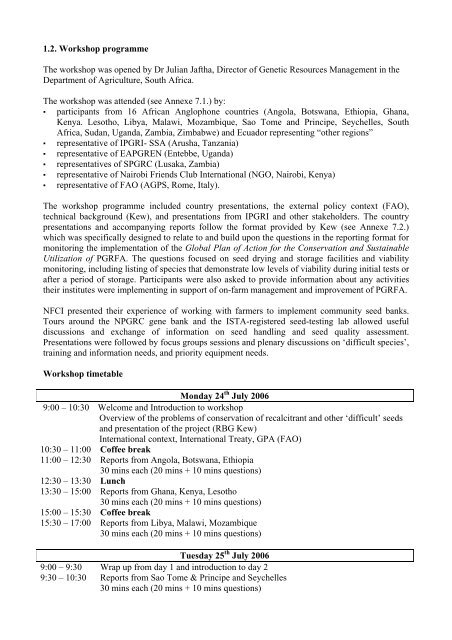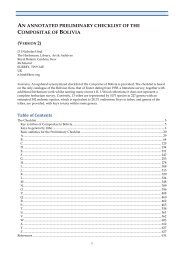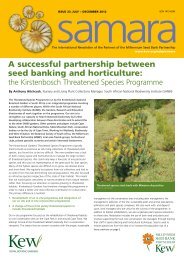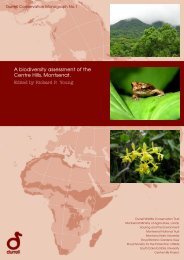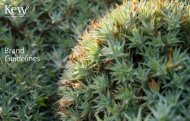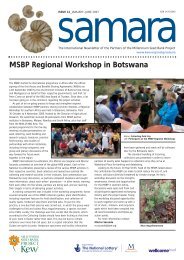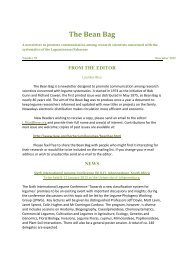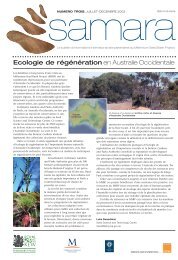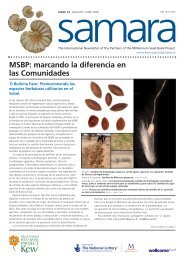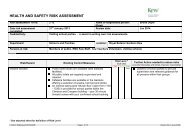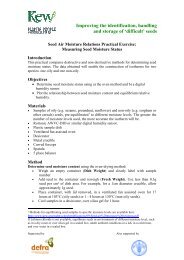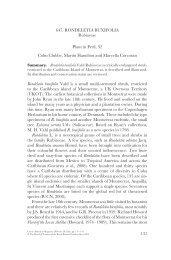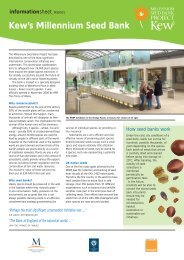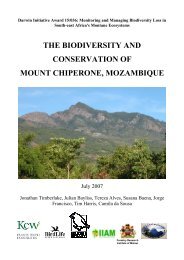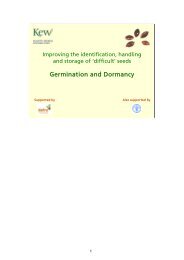Improving the identification, handling and storage of âdifficultâ seeds ...
Improving the identification, handling and storage of âdifficultâ seeds ...
Improving the identification, handling and storage of âdifficultâ seeds ...
You also want an ePaper? Increase the reach of your titles
YUMPU automatically turns print PDFs into web optimized ePapers that Google loves.
1.2. Workshop programme<br />
The workshop was opened by Dr Julian Jaftha, Director <strong>of</strong> Genetic Resources Management in <strong>the</strong><br />
Department <strong>of</strong> Agriculture, South Africa.<br />
The workshop was attended (see Annexe 7.1.) by:<br />
▪ participants from 16 African Anglophone countries (Angola, Botswana, Ethiopia, Ghana,<br />
Kenya. Lesotho, Libya, Malawi, Mozambique, Sao Tome <strong>and</strong> Principe, Seychelles, South<br />
Africa, Sudan, Ug<strong>and</strong>a, Zambia, Zimbabwe) <strong>and</strong> Ecuador representing “o<strong>the</strong>r regions”<br />
▪ representative <strong>of</strong> IPGRI- SSA (Arusha, Tanzania)<br />
▪ representative <strong>of</strong> EAPGREN (Entebbe, Ug<strong>and</strong>a)<br />
▪ representatives <strong>of</strong> SPGRC (Lusaka, Zambia)<br />
▪ representative <strong>of</strong> Nairobi Friends Club International (NGO, Nairobi, Kenya)<br />
▪ representative <strong>of</strong> FAO (AGPS, Rome, Italy).<br />
The workshop programme included country presentations, <strong>the</strong> external policy context (FAO),<br />
technical background (Kew), <strong>and</strong> presentations from IPGRI <strong>and</strong> o<strong>the</strong>r stakeholders. The country<br />
presentations <strong>and</strong> accompanying reports follow <strong>the</strong> format provided by Kew (see Annexe 7.2.)<br />
which was specifically designed to relate to <strong>and</strong> build upon <strong>the</strong> questions in <strong>the</strong> reporting format for<br />
monitoring <strong>the</strong> implementation <strong>of</strong> <strong>the</strong> Global Plan <strong>of</strong> Action for <strong>the</strong> Conservation <strong>and</strong> Sustainable<br />
Utilization <strong>of</strong> PGRFA. The questions focused on seed drying <strong>and</strong> <strong>storage</strong> facilities <strong>and</strong> viability<br />
monitoring, including listing <strong>of</strong> species that demonstrate low levels <strong>of</strong> viability during initial tests or<br />
after a period <strong>of</strong> <strong>storage</strong>. Participants were also asked to provide information about any activities<br />
<strong>the</strong>ir institutes were implementing in support <strong>of</strong> on-farm management <strong>and</strong> improvement <strong>of</strong> PGRFA.<br />
NFCI presented <strong>the</strong>ir experience <strong>of</strong> working with farmers to implement community seed banks.<br />
Tours around <strong>the</strong> NPGRC gene bank <strong>and</strong> <strong>the</strong> ISTA-registered seed-testing lab allowed useful<br />
discussions <strong>and</strong> exchange <strong>of</strong> information on seed <strong>h<strong>and</strong>ling</strong> <strong>and</strong> seed quality assessment.<br />
Presentations were followed by focus groups sessions <strong>and</strong> plenary discussions on ‘difficult species’,<br />
training <strong>and</strong> information needs, <strong>and</strong> priority equipment needs.<br />
Workshop timetable<br />
Monday 24 th July 2006<br />
9:00 – 10:30 Welcome <strong>and</strong> Introduction to workshop<br />
Overview <strong>of</strong> <strong>the</strong> problems <strong>of</strong> conservation <strong>of</strong> recalcitrant <strong>and</strong> o<strong>the</strong>r ‘difficult’ <strong>seeds</strong><br />
<strong>and</strong> presentation <strong>of</strong> <strong>the</strong> project (RBG Kew)<br />
International context, International Treaty, GPA (FAO)<br />
10:30 – 11:00 C<strong>of</strong>fee break<br />
11:00 – 12:30 Reports from Angola, Botswana, Ethiopia<br />
30 mins each (20 mins + 10 mins questions)<br />
12:30 – 13:30 Lunch<br />
13:30 – 15:00 Reports from Ghana, Kenya, Lesotho<br />
30 mins each (20 mins + 10 mins questions)<br />
15:00 – 15:30 C<strong>of</strong>fee break<br />
15:30 – 17:00 Reports from Libya, Malawi, Mozambique<br />
30 mins each (20 mins + 10 mins questions)<br />
Tuesday 25 th July 2006<br />
9:00 – 9:30 Wrap up from day 1 <strong>and</strong> introduction to day 2<br />
9:30 – 10:30 Reports from Sao Tome & Principe <strong>and</strong> Seychelles<br />
30 mins each (20 mins + 10 mins questions)


